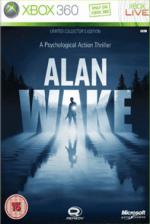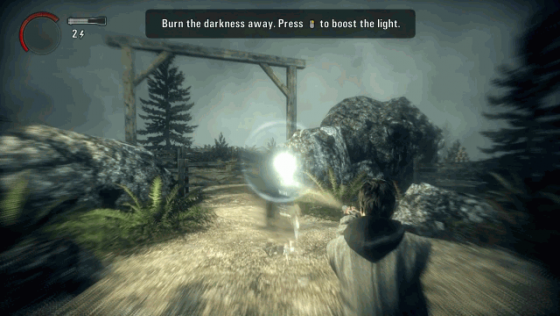
Gaming Age
 13th January 2024
13th January 2024
Author: Aaron Vaughn
Publisher: Microsoft Game Studios
Machine: Xbox 360 (EU Version)
Alan Wake
He's here.
For some people, the wait for Alan Wake has been so long that it almost seems surreal to have it finally coming out. This was a game that seemed months away several years ago, then went back into development hell as its original free-roaming console/PC premise was retooled into a linear Xbox 360 exclusive title. Maybe it was for the best, perhaps what it could have been was so much more, but for as long as some have waited-some like me-I have never been more concerned with anything besides the game's original pitch. This is Alan Wake, a writer, in the middle of a small mountain town where some creepy supernatural stuff is happening. That's all I needed to know to be excited, and all I knew when the game finally found its way onto my doorstep.
Chapter One: Biting Off More Than You Can Chew
Alan is essentially the new Stephen King, and it's well known that the celebrity writer is visiting Bright Falls on vacation with his wife. This introduces our main character as kind of a jerk, but it's clear that he's coming down from what must have been a stressful time leading up to his vacation, as he's short with just about everyone in town during the initial parts of the game. Just after arriving, his wife Alice mysteriously disappears and we are left wondering why-with the rest of the game to discover what happened. It's a game driven by story, and that was a big focus when playing through. While the writing wavers between high-school-English-metaphor lows, and then to prime-time-TV highs, it's clear that Remedy cared a lot about how everything tied into itself, and a corny line is unfortunately a result of bad pacing-as things I rolled my eyes at tended to find an explanation later on that made sense. Fortunately, there is never a dull moment, and once the story has its hooks in you, there are a lot of unanswered questions that beg to be answered.
Maybe it's not plot twists that do it, but how unbalanced some of the side stories seem to be. The game's main plot is told through cutscenes, gameplay, and Alan's self-narration, but there is plenty of story fleshed out in manuscript pages which can be collected along the way. Once again, main plot pages are right along the way, but other things-things that might explain why a character only shows up a few times and still effects the story in a significant way-are hidden in some devious places. This encourages multiple play throughs, but if players don't go looking for manuscript pages they can expect to shave off a couple hours of page hunting, but finish the story with many unanswered questions.In my experience, I got sick of hunting and wanted to play through the game to see what happened next, but it adds life. This and another collectible are scattered in some of the most hidden areas and while they extended playtime, seemed like a cheap way of unnecessarily padding what is otherwise great pacing. The only other problem was that I felt more compassion for Alan's Agent, Barry, than I did for Alice, and wish that the couple's relationship had been given some more time to let the audience empathize with Alan's plight.
Chapter Two: Take The Gun, Use The Light
Gameplay in Alan Wake is at the same time fun and yet restricting. Everything is mapped in a sensible manner: inventory on the D-pad, aiming with L trigger/firing with R trigger, jump with A, etc. However, I couldn't help but feel like I was playing a game designed with mechanics from a generation or so ago. Maybe that's because the gameplay just "makes sense" when you pick it up, feeling too familiar, or perhaps it's the fact that the tutorial really is the extent of the gameplay.
What probably has more to do with it is how these functions are applied. Enemies are "Taken" by the darkness that haunts Alan's world, and you must burn off this shield with a flashlight, or anything more powerful if you can find it. This is indicated with a shrinking lens flare around the enemy and a bright flash once they're vulnerable to gunfire. I was surprised not to find any melee attacks in a game like this, and for a game that has enemies getting so close I would have expected close-quarters combat or something aside from firearms. Because there is little variety in disposing of the Taken, it becomes a matter of rinse and repeat from start to finish. Fortunately the combat never becomes dull, as in later areas it becomes as matter of fleeing rather than fighting, as the darkness overwhelms you with Taken.Chapter Three: God Dammit Run
Once the story is mixed with gameplay, it's clear that Remedy's intention was to piece together a compelling rollercoaster ride to entertain players for about 7-8 hours of solid fun. Good. They did their job; consider this a game that will not disappoint. Unfortunately there are some strange setbacks that confuse me as to why some gameplay elements were created to be like they were, and others that people unlike me will whine to the heavens about. These will be things like Alan becoming weary after literally seconds of running. This is the extreme of realism in a videogame, as he runs up a mountain for about as long as anyone playing the game could take before getting winded. I personally appreciated this, but I don't see how it really enhanced the gameplay-unlike a limited inventory which survival horror relies on in order to increase tension. Because Alan can dodge nearly every attack in slow motion, his poor physical shape is nullified because there will always be an escape route by constantly dodging. As well, in nearly every situation sans a few rare scenarios, your goal is to get to the next point of interest as quickly as possible, and that ain't gonna happen by strolling there. Sometimes it's expedited by another means, like driving for instance.
This is one I take issue with. Vehicles do not belong in this game, and perhaps it's for the best that with poor driving mechanics that Alan Wake wasn't a free-roaming title as he has no idea how to drive. He's an okay marksman, but there is no saving his license. The driving sections are worthless and only add a sense of scale and location to where things are in Bright Falls, which could have been done with cutscenes or by some other means. Fortunately, things that might normally frustrate players such as friendly AI or enemy even, or missions such as escort, are all a-okay and keep things moving along at a pace that has you less focused on what you dislike about the game, and more on why you're still playing.
Chapter Four: It Started With A Dream
Like the writing, the graphical dips can be jarring at times, with a cutscene featuring completely different lighting than the real-time world it just came from, or some really muddy texture work in bright lighting. While the highlights do enough to compensate for Alan Wake's faults on a general level, the game ultimately feels like a proposal from Remedy, of something that "could be" more. It feels unfinished, unpolished, and then at the same time has sections that are so engrossing and memorable that you sit back at a chapter closing to title card wondering why we need to rely on sequels to blow our minds at what great games can be. Even as the game closes with a cliffhanger, the first thought in my mind was that Remedy is asking us to invest into something that can be the true product of their imagination.
Then again, just as things were getting nice and abstract, it was over. What I felt was an abrupt ending made me reluctant to consider what I thought through various sections of the game-that I would love to see bright Falls on either PC or next generation's hardware-because it deserves so much more than what the Xbox 360 managed to crank out. This is a game that somehow feels as though it had outgrown itself right up to the end where cuts had to be made one after the other.
Chapter Five: An Ocean
Alan Wake will have a cult following, I can say this with a clear conscience. It deserves one, too, with all kinds of little things to appreciate, from the radio talk show host to the serialized Twilight Zone-inspired television series on various TV sets. The game is by no means perfect but it is a rollercoaster ride that has very few slow sections, and for someone who has played a lot of crap, and a lot of games within my life, it's rare to come across one for review even where I look forward to the next time I get to sit down with it. While AW can be completed in probably even one sitting, it will be for most people a few evenings of entertainment that will leave gamers wanting more at the end. It has its shortcomings, and plenty of flaws, but the confusing consensus that must be played to be understood is that none of its faults manage to be glaring in any way-disruptive as they can be at times.
There is much to say which doesn't come to mind at the time, and many things that I have discussed with friends and on forums about this game that don't have a place within this review. All I'll say is to give it a swing, at least for its endeavors in storytelling for videogames. It's no Heavy Rain, but for a game that intended to be loaded with atmosphere and digitize what playing a novel might be like, it delivers on all fronts.
Other Xbox 360 Game Reviews By Aaron Vaughn
Scores
Xbox 360 Version| Overall | 75% |















